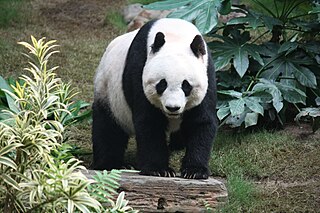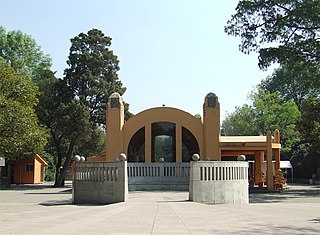
The giant panda, sometimes called a panda bear or simply panda, is a bear species endemic to China. It is characterised by its bold black-and-white coat and rotund body. The name "giant panda" is sometimes used to distinguish it from the red panda, a neighboring musteloid. Though it belongs to the order Carnivora, the giant panda is a folivore, with bamboo shoots and leaves making up more than 99% of its diet. Giant pandas in the wild occasionally eat other grasses, wild tubers, or even meat in the form of birds, rodents, or carrion. In captivity, they may receive honey, eggs, fish, yams, shrub leaves, oranges, or bananas along with specially prepared food.

Ocean Park Hong Kong, commonly known as Ocean Park, is a marine mammal park, oceanarium, animal theme park and amusement park situated in Wong Chuk Hang and Nam Long Shan in the Southern District of Hong Kong. It is the second largest theme park in Hong Kong, after Hong Kong Disneyland, as well as the largest theme park in Hong Kong by area. It is also the second oldest theme park in Hong Kong, after the now-defunct Lai Chi Kok Amusement Park which closed on 31 March 1997, four months before the 1997 handover.

Chapultepec Zoo is a zoo located in Chapultepec Park; it is one of four zoos near Mexico City, and the best known Mexican zoo. It was founded July 6, 1923, by Mexican biologist Alfonso Luis Herrera using donations from private citizens and governmental funds from the Ministry of Agriculture and Development, and also with funds from the Society of Biological Studies.

Ling-Ling and Hsing-Hsing were two giant pandas given to the United States as gifts by the government of China following President Richard Nixon's visit in 1972. As a gift, the U.S. government sent China a pair of musk oxen.

The Ocean Park Conservation Foundation, Hong Kong, often referred to by its initialism OPCFHK is the conglomerate of the former Ocean Park Conservation Foundation (OPCF) and The Hong Kong Society for Panda Conservation (HKSPC) established under the Ocean Park Corporation, with effect from 1 July 2005. It is a registered charitable non-governmental organisation.
SS Antenor was a UK steam turbine passenger and refrigerated cargo liner launched in 1924. She was the third of five ships to bear the name.

Bai Yun was the first female giant panda who was born at the Wolong Giant Panda Research Center in China. From September 1996 she lived at the San Diego Zoo for more than 20 years, until being returned to China in May 2019. Bai Yun gave birth to her sixth cub in 2012 since arriving at the San Diego Zoo, considered the most surviving pandas born at a breeding facility outside of native China. Bai Yun returned to China with her last-born as the 23-year conservation loan of the pandas came to an end between China and San Diego Zoo Global.

Taotao was a Chinese giant panda. Taotao was China's oldest living giant panda at the time of her death at the age of 36.

Ling Ling was a male Chinese-born giant panda who resided at the Ueno Zoo, the largest zoo in Tokyo, Japan. At the time of his death at the age of 22, Ling Ling was the only giant panda at the Ueno Zoo and the oldest panda in Japan. He served as an important symbol of the Ueno Zoo and of friendship between Japan and China. Ling Ling, who was given to Japan in 1992, was the only giant panda in the country who was directly owned by Japan. There are eight other giant pandas in Japan as of April 2008, but they are all on loan to Japan from China. Despite being a male panda, Ling Ling's name meant "darling little girl" in Chinese.

River Wonders, formerly known as River Safari, is a river-themed zoo and aquarium located in Mandai, Singapore, forming part of the Mandai Wildlife Reserve. It is built over 12 hectares and nestled between its two counterparts, the Singapore Zoo and the Night Safari, Singapore. It is the first of its kind in Asia and features freshwater exhibits and a river boat ride as its main highlights. The safari was built at a cost of S$160m, with an expected visitor rate of 820,000 people yearly.

Granny, also known as J2, was a female orca of the J pod of southern resident orcas notable for her long life. Early estimates placed her birth in 1911, putting her at 105 years old at the time of her death. However, this estimate was later theorized to have been based on mistaken information and more recent studies put her at 65–80 years old. If she was 105, she would have been the oldest known orca at the time of her death. Granny lived in the northeast Pacific Ocean and coastal bays of Washington state and British Columbia. She was last seen on October 12, 2016, and was considered deceased by The Center for Whale Research in January 2017.
As of 2019, there are 27 zoos in 21 countries outside of mainland China, that have giant pandas. These zoos have contracts with China to house these pandas for a few years. The two exceptions are the three pandas held at Taipei Zoo, which are owned by the Taiwanese government, and one panda held in Mexico. Giant pandas are on the IUCN Red List so part of the reason these contracts exist between China and international zoos is to try to help the species reproduce before they are brought back to their native land. For this reason, pandas are treated very well.
The following lists events during 2016 in Hong Kong.
Jia Yueyue and Jia Panpan are twin giant pandas born at the Toronto Zoo on 13 October 2015, to mother, Er Shun and father, Da Mao. They were the first giant pandas to be born in Canada, and only the second giant panda twins to survive the neonatal period in North America. Their birth was the result of one of two artificial insemination procedures overnight from 13 to 14 May 2015. The pandas went on public exhibit at the zoo on 12 March 2016. The last day that the giant pandas were viewable at the Toronto Zoo was 18 March 2018. The two pandas have since left Canada and now reside at the Chengdu Research Base of Giant Panda Breeding.
Pan Pan was a male giant panda who was resident at the Giant Panda Protection and Research Centre in Chengdu, China. At the time of his death, he was the oldest male giant panda in captivity. The oldest living giant panda in captivity at the time of Pan Pan's death was Basi, a female giant panda who was then 37.

Basi was a female giant panda. Since Jia Jia's death in 2016, she was the oldest living panda in captivity.

An An was a male giant panda residing in Ocean Park Hong Kong, a gift from the Central People's Government of China to the Hong Kong Special Administrative Region in 1999. He was the longest-living male giant panda in the world under human care before his death in 2022.












